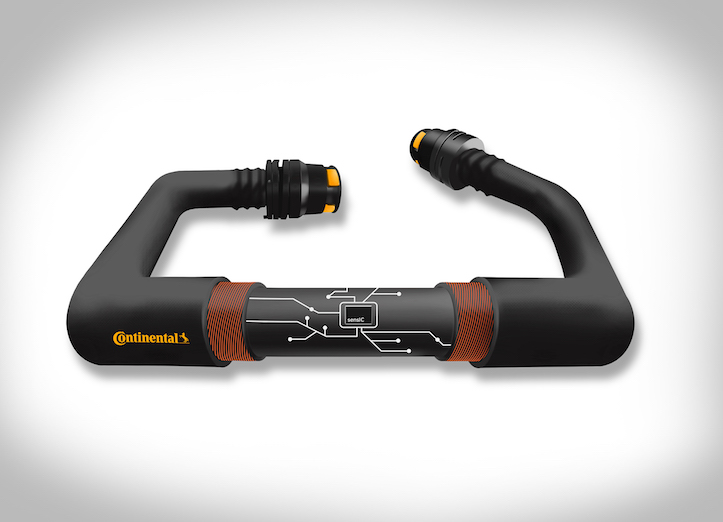 Project sensIC demonstrates integrated sensor technology based on printed electronics in hose lines for battery electric vehicles
Project sensIC demonstrates integrated sensor technology based on printed electronics in hose lines for battery electric vehicles
Continental expands portfolio with hybrid electronics combining printed electronics and silicon chips
Project partnership with industrial companies and universities runs until spring 2024
Sensor system in the form of a silicon chip for temperature measurement, a non-clonable safety feature and external tamper protection with particle-based fluorescence identification increases safety in vehicles and sensitive production facilities
For some time now, the technology company Continental has been equipping many of its rubber and plastic products with sensor technology - for condition monitoring, efficiency control and process regulation. Since Continental would like to integrate both sensor technology and intelligent systems even more comprehensively into its rubber and elastomer solutions in the future, the company is now launching the sensIC project in cooperation with partners from industry and science. As the collaborative coordinator, Continental is driving the project forward with its integrated sensor technology based on printed electronics in hose lines for electric vehicles.
Media-carrying lines for thermal management in electric vehicles
The project, which is being funded by the German Federal Ministry of Education and Research with a share of 2.9 million euros, is about equipping hoses for thermal management in electric vehicles with integrated temperature sensors. The electronics should not allow any manipulation during production, within the supply chain or during subsequent use. This is because a high level of safety is becoming more and more important with the increasing integration of electronics in automobiles and systems. This will also enable additional functions to be realised and it will be possible to offer services and digital business models over the entire lifetime of the products to a greater extent than before. Examples include live information on system health, predictive maintenance services or function updates after delivery.
"The sensIC project exemplifies how integrated sensor technology based on printed electronics can be realised on an industrial scale. This represents an important contribution to the mobility turnaround and enables energy-saving and thus sustainable technical solutions," says Dr Tim Wolfer, who coordinates the entire research project as project manager for functional printing processes. Through the project, the technology company Continental wants to expand its product portfolio with safe electronics by integrating temperature sensors and communication modules into hose systems. The so-called hybrid systems are based on a combination of printed electronics and specially manufactured silicon chips. The project is scheduled for completion in spring 2024.
Secure sensor technology protects against cyber attacks on vehicles and plants
Meanwhile, Continental is also equipping hoses in industrial plants with sensors to monitor the operating status and immediately detect errors or malicious manipulation of processes - for example, at pharmaceutical manufacturers or in the food industry. Cyber attacks on vehicles are also possible and represent a high security risk. This is because sensors that convert physical conditions such as pressure or temperature into data streams are a particularly exposed target for hackers. The security of sensors and sensor data is therefore of great importance.
"In order to meet precisely these requirements, it is important to combine a mechanically flexible electrical circuit with the less flexible evaluation chips in a product that should add value and be secure without further effort and with the lowest possible additional costs," emphasises Wolfer. In the sensIC project, hybrid integrated sensor circuits are now to be built into hoses, as required for automotive and industrial applications for monitoring the temperature of batteries, in drinking water systems and in pharmaceuticals. The intelligent and safe sensor technology will be integrated in the form of a silicon chip for temperature measurement, a PUF (physical unclonable function) and an external manipulation protection with particle-based fluorescence identification. The abbreviation IC stands for integrated circuits.
More security through hybrid PUF circuitry
And this is how it works in detail: As an electronic, non-clonable identification feature, a differential PUF circuit based on printed transistors and silicon-based read-in and read-out electronics is integrated with a sensor circuit. The sensor circuit contains a silicon IC that is connected to the hybrid PUF via a corresponding interface using special assembly and connection technology, thus forming the "secure" overall system.
For integration, the PUF is connected to the silicon IC by additive processes and the system is encapsulated. At the same time, special inorganic fluorescent particles are to be mixed into suitable material components with a sealing effect, whose random particle pattern enables a forgery-proof individual recognition feature and thus contributes to the security of the entire component.
At the end of the project, there should be a hardware demonstrator in which the entire component is subjected to the usual mechanical stress tests and, in addition, the electronic system must withstand model-based cyberattacks in simulations.
Platform system for further applications
In addition to the aforementioned use as a safe battery sensor system, the developed platform system can also be used in completely different fields of application. The monitoring of safety-critical hose applications in the pharmaceutical and raw materials industries is also to be investigated, whereby the partners want to ensure the principle, tamper-proof monitoring of the hose systems as well as the traceability of all components throughout the entire life cycle.
Continental's partners in this project are Cyient GmbH, Polysecure GmbH, the Karlsruhe Institute of Technology (KIT), the Leibniz Institute for New Materials, Offenburg University of Applied Sciences and Elmos Semiconductor SE.
www.contitech.de